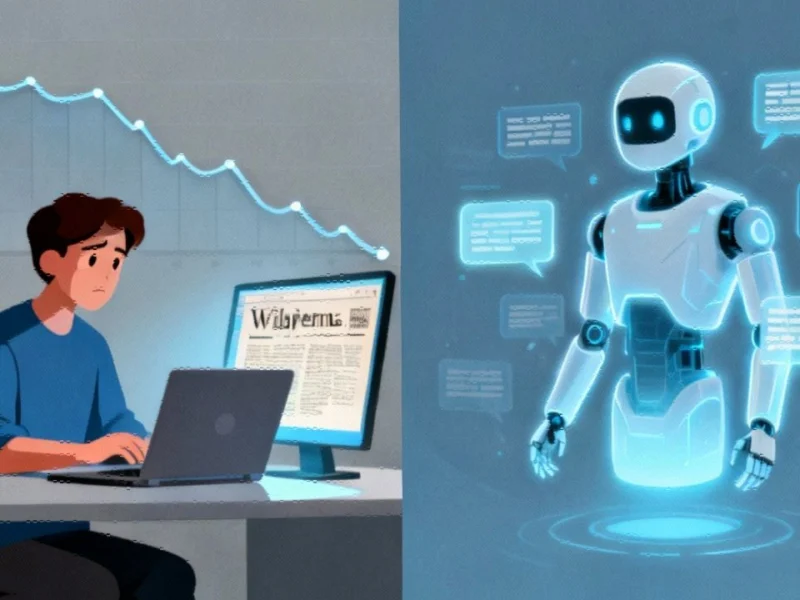According to EU-Startups, Cologne-based AI company octonomy has raised approximately €18.5 million ($20 million) in a funding round led by Macquarie Capital Venture Capital, with participation from Capnamic, NRW.Bank, and the TechVision Fund. Founded in 2024, the company specializes in agentic AI systems for complex enterprise support workflows, particularly in heavy equipment industries, achieving a verified 95% accuracy rate in processing technical documentation, schematics, and live system data. CEO Sushel Bijganath emphasized that their technology addresses the 80% failure rate of AI projects when complexity increases, delivering responses that significantly outperform the 50% accuracy rates common with standard AI platforms. The funding brings octonomy’s total capital to $25 million as they expand across European and US markets with deployment times under 20 days and direct integration into existing enterprise systems.
The Agentic Revolution: Beyond Simple Chatbots
What makes octonomy’s approach fundamentally different isn’t just the accuracy metrics but the architectural philosophy. While most enterprise AI solutions operate as single-point assistants, octonomy’s multi-agent system represents a paradigm shift toward collaborative digital teams. The company’s platform coordinates specialized agents that mirror how human technical teams actually work—one agent analyzing wiring diagrams while another checks inventory and a third handles warranty verification. This distributed approach to problem-solving addresses the core limitation of monolithic AI systems: the inability to handle multiple complex tasks simultaneously while maintaining context across different data types and systems.
Heavy Industry’s Digital Transformation Accelerates
The timing of this funding reflects a critical inflection point in industrial digitalization. For years, heavy equipment manufacturers and service providers have struggled with knowledge retention as experienced technicians retire and complex systems become more interconnected. octonomy’s “digital twin” approach essentially captures institutional knowledge at scale, creating a permanent expert system that doesn’t suffer from turnover or fatigue. This capability becomes particularly valuable in industries like manufacturing, energy, and transportation where unplanned downtime costs can reach millions per hour. The verified 95% accuracy rate represents a threshold where AI moves from being an experimental tool to a reliable operational asset that companies can confidently integrate into critical workflows.
The Enterprise AI Battlefield Shifts
This funding round signals a broader market realignment where specialized, domain-specific AI solutions are gaining traction against general-purpose enterprise platforms. Companies like ServiceNow, Salesforce, and traditional IT service management providers now face competition from AI-native companies that understand specific industry pain points at a granular level. octonomy’s direct integration with systems like SAP, Salesforce, and SharePoint without data migration represents a significant competitive advantage, eliminating the implementation barriers that often stall enterprise AI projects. The 20-day deployment timeline challenges the conventional wisdom that complex AI implementations require months of consulting and customization, potentially resetting customer expectations across the industry.
The German Engineering Edge in Global AI
octonomy’s German origins and compliance framework—GDPR, EU AI Act, and ISO 27001 certification—create a formidable moat in global markets, particularly as AI regulation tightens worldwide. The “built in Germany” designation carries weight in industrial sectors where reliability, security, and regulatory compliance are non-negotiable. This positions the company advantageously against US and Asian competitors who may struggle to meet Europe’s stringent AI governance requirements. As global enterprises increasingly demand provable compliance and security certifications, octonomy’s foundational architecture gives them access to markets that might be closed to less rigorously developed solutions.
The Road Ahead: Autonomous Service Operations
Looking forward, the success of agentic systems like octonomy’s suggests a future where entire service operations can run with minimal human intervention. The ability to coordinate multiple AI agents across different systems and data types points toward fully autonomous service centers where human technicians focus only on the most complex edge cases. This could fundamentally reshape service business models, moving from time-and-materials approaches to outcome-based pricing where customers pay for guaranteed uptime rather than hourly support. As these systems prove their reliability, we’re likely to see accelerated adoption across capital-intensive industries where the cost of being wrong is simply too high to tolerate traditional AI’s limitations.




